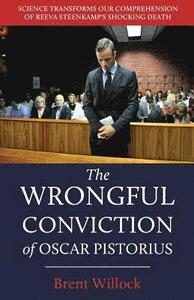 Click Here to Read: Chapter 3: Trial and Judgement from The Wrongful Conviction of Oscar Pistorius by Brent Willock.
Click Here to Read: Chapter 3: Trial and Judgement from The Wrongful Conviction of Oscar Pistorius by Brent Willock.
Praise for this Book from Leading Authorities in the Scientific and Forensic Fields:
“This book is a murder mystery but not a ‘who done it?’ We know who fired the shots through the door of the toilet room killing Reeva, the girlfriend of Oscar Pistorius. He had been asleep next to her when he was awakened by a noise he thought was due to one or more intruders. He ran to the bathroom calling to Reeva to phone the police and shouting to the intruder(s) to get out of his house. Neither she nor they responded. After being frozen in fear, he shot through the locked door and thendiscovered Reeva close to death. From here on the story is a detailed analysis of the legal procedures, the misunderstandings of the state of mind of the accused: was he fully conscious and so responsible for murder? The author, Brent Willock, is highly informed to make a compelling case that Oscar was not fully conscious, therefore not responsible, and to address the other possible states of mind Oscar may have gone through during and following this tragic event. The book sums up the pressing need for lawyers, judges and jurors to become familiar with the unconscious mind of sleep that does not obey the logic of the mind fully awake.” — Rosalind Cartwright, Ph.D. Professor and Chairman Emerita, Department of Behavioral Sciences and Director, Sleep Disorder Center, Rush University Medical Center, Chicago. Author, The Twenty-four Hour Mind: the role of sleep and dreaming in our emotional lives (Oxford University Press).
“This well-researched, scientifically accurate, and nicely written book by Dr. Willock invokes an alternative explanation for Oscar Pistorius’ behaviors on February 14, 2013, namely that the tragic event could be well-explained by a parasomnia (confusional arousal/sleepwalking). such conditions are a reminder that wake and sleep are not mutually exclusive, but rather may co-exist simultaneously: part of the brain capable of producing complex behaviors is awake, while parts responsible for monitoring and laying down memories of such behaviors are asleep permitting behavior without conscious awareness and therefore without culpability. Furthermore, during these states of mixed wake and sleep, there may be impaired perception of the environment with diminished insight, judgement, and reasoning resulting in flawed recall of details of these events which may appear unrealistic, puzzling, confusing, contradictory, unreasonable, or irrational. This scientifically-based concept should be valuable to all parties (perpetrator, victim, prosecution, and defense) in future similar cases.” — Mark W. Mahowald, MD, Professor of Neurology, University of Minnesota Medical School, Minneapolis, MN, USA (Retired) —Michel A. Cramer Bornemann, MD, D-ABSM, FAASM, Lead Investigator—Sleep Forensics Associates (SFA)
Synopsis:
Just when the world thought Oscar Pistorius? meteoric rise to Olympic glory and international celebrity had terminated abysmally in prison, Brent Willock?s scientific perspective reopens this gripping narrative for an astonishing re-view.
Olympian Oscar Pistorius? spectacular ascent to fame ground to a screeching halt in the wee hours of Valentine?s Day, 2013. Hearing a sound emanating from his bathroom, he grabbed his pistol and stumbled to the washroom, screaming at the intruders to leave. Fearing someone was about to emerge to harm him and his girlfriend, Reeva, he fired four bullets into the bathroom. Soon he realized he had killed his lover. Horrified, he summoned the authorities. The investigating detective believed this was yet another case of an escalating argument where a man murdered his partner. World opinion is split. Some believe Oscar. Others are convinced he committed a despicable crime of passion.
Distinguished clinical psychologist Brent Willock brings an entirely new perspective to bear on these horrific events: that Oscar?s horrific actions occurred while he was in a state of paradoxical sleep (parasomnia). Throughout this book, Willock uses scientific scrutiny and legal precedence to resolve the crucial anomalies surrounding the Oscar Pistorius trial. Willock also discusses how mental health experts and the defense team might have overlooked the hypothesis of parasomnia that could have exonerated Oscar.
Millions who followed the Blade Runner’s astonishing achievements, uplifted and inspired by his triumph over physical adversity, were crushed by his precipitous plunge from grace. They were baffled. Even Oscar himself, in a television interview shortly before his sentencing, achingly asked, “I always think, How did this possibly happen? How could this have happened?” At last, Willock’s elegant work responds to these poignant questions that have so plagued and pained Reeva’s family, friends, Oscar, and, indeed, the world.
PastedGraphic-1.tiff
Available from Amazon.com, Barnes and Noble.com, or any bookstore can order it for you from the book distributor Ingram.
